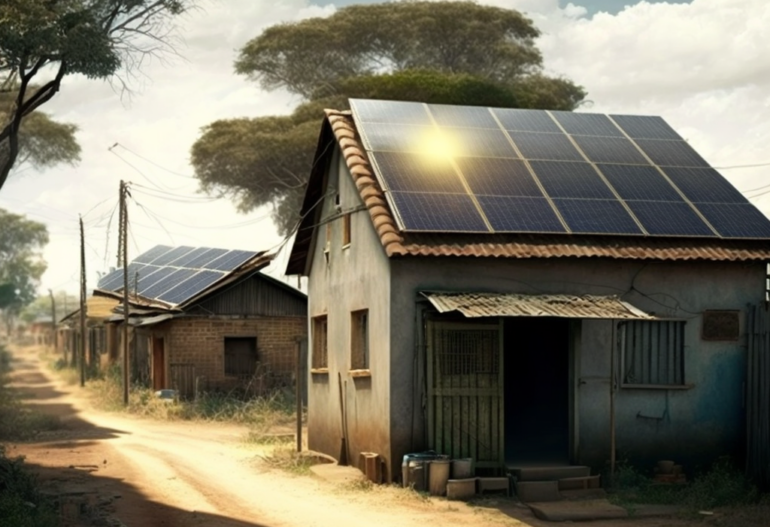No products in the cart.
Promoting Energy Access and Sustainability in Africa through Solar PV Systems

Introduction
Energy access and sustainability are crucial for the development and prosperity of African nations. Despite the abundant natural resources, the majority of the African population still lacks access to reliable and affordable electricity. This lack of energy access affects not only the quality of life and hampers economic growth, but also it puts a strain on the environment, as many households resort to burning fossil fuels or deforest trees for their energy needs.
Solution
Solar photovoltaic (PV) systems offer a decentral, sustainable and scalable solution to the energy shortage in Africa due to either limited generation capacity or geographic constraints for economical transmission and distribution of energy. By harnessing the energy of the sun, solar PV systems provide life changing energy that is both cost-effective and environmentally friendly.
The Benefits of Solar PV Systems in Africa There are numerous benefits to promoting energy access and sustainability in Africa through solar PV systems. Some of the most significant include:
- Improving quality of life: Access to electricity has a direct impact on the quality of life. With solar PV systems, households can have reliable electricity for lighting, cooling, and other essential needs, improving their daily lives and health.
- Boosting economic development: Access to electricity is also essential for economic growth. Solar PV systems can provide electricity to small businesses, helping them grow and create jobs. Furthermore, they can also power schools and healthcare facilities, enabling the delivery of essential services.
- Reducing greenhouse gas emissions: By replacing fossil fuels with clean and renewable energy, solar PV systems help to reduce greenhouse gas emissions, which contribute to climate change. This is particularly important in Africa, where the majority of energy production still comes from fossil fuels.
- Increasing energy independence: With solar PV systems, African nations can reduce their dependence on foreign oil and other energy source imports. This helps to build resilience and energy independence, while also boosting the local economy.
- Strengthening grid infrastructure: By connecting remote communities to the grid through solar PV systems, grid infrastructure can be strengthened and improved, making it easier to bring electricity to even more communities in the future.
Challenges to overcome despite the numerous benefits: there are still challenges to overcome in promoting energy access and sustainability in Africa through solar PV systems. These include:
- Lack of funding: Developing and installing solar PV systems can be expensive for African community, and there is a lack of funding available to support PV projects. This is particularly true in rural and remote areas, where access to funding can be limited.
- Technical challenges: Installing solar PV systems in remote and rural areas can be challenging, and there may be limited access to technical expertise and support.
- Policy and regulatory barriers: There may also be policy and regulatory barriers that limit the growth of solar PV systems in Africa. This can include a lack of clear regulations and incentives, as well as a lack of governmental support.
Conclusion
Solar PV systems provide a feasible and sustainable answer to Africa’s energy shortage. By delivering clean, renewable energy, they enhance the quality of life, drive economic growth, decrease greenhouse gas emissions, and enhance energy independence. Although there are hindrances, including funding constraints, technical difficulties, and policy restrictions, promotion of energy access and sustainability via Solar PV systems can pave the way for a brighter and more sustainable future for Africa.
References:
- International Energy Agency (IEA). (2019). Energy Access Outlook 2019. https://www.iea.org/reports/energy-access-outlook-2019
- World Bank Group. (2019). Energy Access in Sub-Saharan Africa. https://data.worldbank.org/topic/energy-access
- United Nations Development Programme (UNDP). (2019). Renewable Energy and Energy Efficiency in Africa. https://www.undp.org/content/undp/en/home/sustainable-development-goals/goal-7-affordable-and-clean-energy.html
Useful Links:
- International Renewable Energy Agency (IRENA). (2021). Renewable Energy in Africa. https://www.irena.org/topics/renewable-energy-in-africa
- African Development Bank (AfDB). (2021). Energy Access in Africa. https://www.afdb.org/en/topics-and-sectors/energy-access-in-africa/
- United Nations Energy (UN-Energy). (2021). Energy Access in Africa. https://www.un.org/en/sections/issues-depth/energy-access-africa/
©2023 RASENERGY OÜ, All Rights Reserved.
